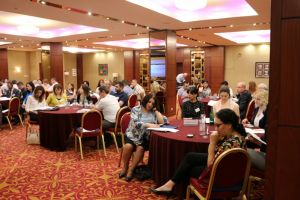
EU4Innovation: STEM Pilot Activities
Project Description
This project is designed to improve the quality of Science, Technology, Engineering, and Mathematics (STEM) education in general education in the pilot region(s) of Armenia. Furthermore, the results of the pilot will be rolled out throughout Armenia by the Ministry of Education, Science, Culture and Sport (MoESCS) to improve the quality of secondary education in Armenia.
The project aims to support the MoESCS in redeveloping the curricula, associated pedagogical materials, textbooks, teachers’ guides, and selected exams or examinations blueprints for STEM subjects in grades 5-12, using contemporary methods and technologies, as well as strengthening the National Institute of Education.
The project aims to support the MoESCS in redeveloping the curricula, associated pedagogical materials, textbooks, teachers’ guides, and selected exams or examinations blueprints for STEM subjects in grades 5-12, using contemporary methods and technologies, as well as strengthening the National Institute of Education.
Specific Objective
The Development Objective of the Project is to design, implement and monitor a regional pilot to strengthen student-centered learning in STEM subjects in selected rural schools, and generate lessons learned to facilitate a nationwide roll-out.
Expected Results
The objective of the Trust Fund is to improve the quality of STEM education in general education in the pilot region(s) of Armenia (Tavush and, if the funds are sufficient, partially Shirak region).
1. Component A: Improving STEM education and piloting redeveloped curricula and pedagogies (Bank Executed Activities)
Component A is focused on modernizing the STEM curricula and training teachers on modern, student-centered pedagogies to improve STEM education. The international experts hired by the World Bank will share international best practices and provide feedback for a consolidated draft prepared by Armenian experts for the revision of existing curricula (syllabi) for STEM general education (grades 1-12). In addition, insights and best practices for the development of teaching and learning materials package (subject syllabi, lesson plans, draft textbooks, inputs for assessment instruments) for lower secondary education (grades 5-12) will be established. This draft curricula will then be used in the teacher training on modern, student-centered pedagogies and on the use of equipment and materials to be provided through the Recipient Executed Component C2. The modernized curricula and materials (for grades 5-12) will support the pilot and serve to evaluate the effectiveness of the redeveloped curricula and materials. The pilot region is Tavush.
Subcomponent A.1 Redevelopment of STEM curricula and pedagogies
The redevelopment of the curricula and of the teaching and learning materials will be carried out by a working group structure led by a STEM Technical Committee (STEM TC) with support of several sub-committees. The subcomponent will carry out a sequence of activities including but not limited to:
(a) Support for Setting up Committee Structure. Development with MoESCS of the proposal for STEM TC structures and work program.
(b) Support for redevelopment of the curricula. The Bank's advisory services and analytics support will include: (i) review of the content, sequence, levels of difficulty, and coherence of the current STEM curricula in grades 1-12; (ii) development of inputs for teaching and learning packages, including lesson plans, draft textbooks, inputs for assessment instruments compatible with the redeveloped curricula; and (iii) teacher training modules for STEM pilot for grades 5 to 12.
Subcomponent A.2 Pilot of Redeveloped STEM curricula and pedagogies
This subcomponent will carry out the evaluation of the effectiveness of new draft STEM curricula in raising aggregate learning among students in the pilot region. The pilot has two stages. The first stage will test individual “inputs” of the curriculum and teaching and learning materials at the classroom level. The second stage will conduct the full pilot of the redeveloped curriculum for grades 5 to 12 for one year in the pilot region. The subcomponent will deliver training of teachers to implement the new STEM curriculum. The Tavush pilot will use the revised draft curricula and include observation of classrooms, and baseline and end line assessment of learning levels. The pilots will be done both in classroom and laboratories. It will conclude with analysis of changes to learning resulting from new practices.
The Bank’s advisory services and analytics support is provided to carry out the following activities:
(a) Teacher and senior school administration Training—Plan and organize the development of training modules and training of STEM teachers (and school management staff) in all schools in the pilot region(s) to emphasize modern, student-centered pedagogies and innovative methodologies (blended learning) for effective delivery of STEM education.
(b) Development and roll-out of the pilot in the target region(s) to evaluate the new draft curricula (subject syllabi) and teaching and learning materials (lesson plans, draft textbooks, and inputs to assessment instruments).
(c) Analyze the results of the STEM pilot and formulate recommendations that will be made available to the government along with final draft curricula, draft textbooks and associated package of materials for grades 5-12. Satisfaction surveys will be carried out with teachers and senior school administration to inform this process. A quality assurance framework will be proposed to measure impact of the whole action.
2. Component B: Program management, administration, and implementation support
(a) Programme management and administration activities for the Trust Fund, including but not limited to supporting any programme governance arrangements and Trust Fund related meetings; planning and executing work plans and budget; managing communication and conducting outreach; disseminating lessons learned; reporting on progress; and monitoring and evaluating the programme.
(b) Project implementation support of the Recipient-executed activities under the Trust Fund.
3. Component C: Increasing capacity of the National Center of Education Development and Innovation to regulate policies affecting teaching quality and support to the STEM pilot roll-out (Recipient Executed Activities)
This component will have two subcomponents. The first subcomponent will provide advisory services and technical assistance to raise capacity of the National Center of Education Development and Innovation (NCEDI) to develop and manage continuous professional development for teachers. The second subcomponent will acquire the hardware and equipment necessary for the roll-out of the STEM Pilot.
Subcomponent C.1 Increasing capacity of NCEDI for Professional Development of Teachers
The proposed component will work closely with Component A and will support the government in the development of the teacher professional development framework which would outline the knowledge, practice, and professional engagement required from teachers. The development of the framework will be guided by international best practice, stakeholder consultations and alignment with the requirements set forth by the new curriculum. This component will also support the government’s strategy to outsource the provision of teacher training to eligible training providers. Technical assistance will be provided to develop standards for teacher training, defining requirements for the accreditation of teacher training providers, and putting in place a proper quality assurance system to monitor quality and delivery of in-service teacher trainings.
The specific activities supported under this component, include:
(a) Strengthen the Capacity for Teacher Professional Development within NCEDI. This activity entails targeted advisory support to guide development of teacher professional development framework, on the job training of core staff of the unit and opportunities for study tour to learn about best practices and innovations in teacher policies.
(b) Supporting Outsourcing of teacher training. This activity will support development of standards for the accreditation of in-service teacher training providers and will help to set up a proper quality assurance system to evaluate and monitor the quality and delivery of teacher trainings.
Subcomponent C.2 Acquisition of hardware and equipment for the roll-out of the STEM Pilot.
This subcomponent is strongly linked to Component A and will acquire the hardware and material required for the successful roll-out of the STEM pilot. The subcomponent will prioritize purchase of efficient and low-cost equipment for the pilot roll-out to allow replication of the same model country wide in the future. The sub-component will also support minor works where necessary to install new equipment and ensure the needed safety.
1. Component A: Improving STEM education and piloting redeveloped curricula and pedagogies (Bank Executed Activities)
Component A is focused on modernizing the STEM curricula and training teachers on modern, student-centered pedagogies to improve STEM education. The international experts hired by the World Bank will share international best practices and provide feedback for a consolidated draft prepared by Armenian experts for the revision of existing curricula (syllabi) for STEM general education (grades 1-12). In addition, insights and best practices for the development of teaching and learning materials package (subject syllabi, lesson plans, draft textbooks, inputs for assessment instruments) for lower secondary education (grades 5-12) will be established. This draft curricula will then be used in the teacher training on modern, student-centered pedagogies and on the use of equipment and materials to be provided through the Recipient Executed Component C2. The modernized curricula and materials (for grades 5-12) will support the pilot and serve to evaluate the effectiveness of the redeveloped curricula and materials. The pilot region is Tavush.
Subcomponent A.1 Redevelopment of STEM curricula and pedagogies
The redevelopment of the curricula and of the teaching and learning materials will be carried out by a working group structure led by a STEM Technical Committee (STEM TC) with support of several sub-committees. The subcomponent will carry out a sequence of activities including but not limited to:
(a) Support for Setting up Committee Structure. Development with MoESCS of the proposal for STEM TC structures and work program.
(b) Support for redevelopment of the curricula. The Bank's advisory services and analytics support will include: (i) review of the content, sequence, levels of difficulty, and coherence of the current STEM curricula in grades 1-12; (ii) development of inputs for teaching and learning packages, including lesson plans, draft textbooks, inputs for assessment instruments compatible with the redeveloped curricula; and (iii) teacher training modules for STEM pilot for grades 5 to 12.
Subcomponent A.2 Pilot of Redeveloped STEM curricula and pedagogies
This subcomponent will carry out the evaluation of the effectiveness of new draft STEM curricula in raising aggregate learning among students in the pilot region. The pilot has two stages. The first stage will test individual “inputs” of the curriculum and teaching and learning materials at the classroom level. The second stage will conduct the full pilot of the redeveloped curriculum for grades 5 to 12 for one year in the pilot region. The subcomponent will deliver training of teachers to implement the new STEM curriculum. The Tavush pilot will use the revised draft curricula and include observation of classrooms, and baseline and end line assessment of learning levels. The pilots will be done both in classroom and laboratories. It will conclude with analysis of changes to learning resulting from new practices.
The Bank’s advisory services and analytics support is provided to carry out the following activities:
(a) Teacher and senior school administration Training—Plan and organize the development of training modules and training of STEM teachers (and school management staff) in all schools in the pilot region(s) to emphasize modern, student-centered pedagogies and innovative methodologies (blended learning) for effective delivery of STEM education.
(b) Development and roll-out of the pilot in the target region(s) to evaluate the new draft curricula (subject syllabi) and teaching and learning materials (lesson plans, draft textbooks, and inputs to assessment instruments).
(c) Analyze the results of the STEM pilot and formulate recommendations that will be made available to the government along with final draft curricula, draft textbooks and associated package of materials for grades 5-12. Satisfaction surveys will be carried out with teachers and senior school administration to inform this process. A quality assurance framework will be proposed to measure impact of the whole action.
2. Component B: Program management, administration, and implementation support
(a) Programme management and administration activities for the Trust Fund, including but not limited to supporting any programme governance arrangements and Trust Fund related meetings; planning and executing work plans and budget; managing communication and conducting outreach; disseminating lessons learned; reporting on progress; and monitoring and evaluating the programme.
(b) Project implementation support of the Recipient-executed activities under the Trust Fund.
3. Component C: Increasing capacity of the National Center of Education Development and Innovation to regulate policies affecting teaching quality and support to the STEM pilot roll-out (Recipient Executed Activities)
This component will have two subcomponents. The first subcomponent will provide advisory services and technical assistance to raise capacity of the National Center of Education Development and Innovation (NCEDI) to develop and manage continuous professional development for teachers. The second subcomponent will acquire the hardware and equipment necessary for the roll-out of the STEM Pilot.
Subcomponent C.1 Increasing capacity of NCEDI for Professional Development of Teachers
The proposed component will work closely with Component A and will support the government in the development of the teacher professional development framework which would outline the knowledge, practice, and professional engagement required from teachers. The development of the framework will be guided by international best practice, stakeholder consultations and alignment with the requirements set forth by the new curriculum. This component will also support the government’s strategy to outsource the provision of teacher training to eligible training providers. Technical assistance will be provided to develop standards for teacher training, defining requirements for the accreditation of teacher training providers, and putting in place a proper quality assurance system to monitor quality and delivery of in-service teacher trainings.
The specific activities supported under this component, include:
(a) Strengthen the Capacity for Teacher Professional Development within NCEDI. This activity entails targeted advisory support to guide development of teacher professional development framework, on the job training of core staff of the unit and opportunities for study tour to learn about best practices and innovations in teacher policies.
(b) Supporting Outsourcing of teacher training. This activity will support development of standards for the accreditation of in-service teacher training providers and will help to set up a proper quality assurance system to evaluate and monitor the quality and delivery of teacher trainings.
Subcomponent C.2 Acquisition of hardware and equipment for the roll-out of the STEM Pilot.
This subcomponent is strongly linked to Component A and will acquire the hardware and material required for the successful roll-out of the STEM pilot. The subcomponent will prioritize purchase of efficient and low-cost equipment for the pilot roll-out to allow replication of the same model country wide in the future. The sub-component will also support minor works where necessary to install new equipment and ensure the needed safety.
Project map
Curriculum Workshop
PROJECT DETAILS
Armenia
Priority Area:
Partnership that creates Subsector:
Education, Research and Innovation Topic:
Education, Research and Innovation Project Status:
Completed Start Date:
23.12.2018 End Date:
22.12.2022 EU Project Number:
404-659 

